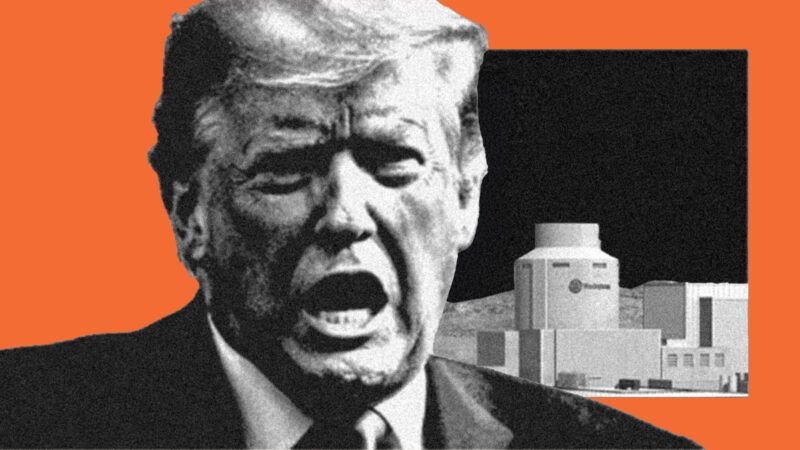Republican Socialism Goes Nuclear: Trump Bets $80 Billion on Government-Backed Energy
After years of decline, nuclear energy's prospects are looking bright. The worst thing the government can do now is get more involved in the industry.

Since President Donald Trump's return to the Oval Office, the federal government has trademarked its own version of Republican socialism by nationalizing steel production and taking equity stakes in chip manufacturers and mining projects. Now, it's getting involved in the nuclear power sector.
On Tuesday, Westinghouse Electric Company announced that it had entered "into a strategic partnership" with the federal government, Brookfield Asset Management, and uranium fuel supplier Cameco Corporation to build "at least" $80 billion worth of Westinghouse's AP1000 nuclear reactors across the country. The agreement was made "in accordance" with Trump's May executive order, which called for the deployment of 10 new large nuclear reactors in the U.S. by 2030, according to Westinghouse.
The details of the agreement are still a bit murky, but the federal government will underwrite at least some of these projects, while others might be financed by Japan. On Tuesday, Japan's trade ministry pledged to invest $550 billion into American projects, in exchange for lower tariff rates from the Trump administration. Included in this package was an "artificial intelligence and a nuclear reactor construction initiative that was expected to be worth up to $100 billion and involve Mitsubishi Heavy [Industries] and Toshiba," reports The New York Times.
The deal might also allow the federal government to take an equity stake in America's largest nuclear power company. Bloomberg's Liam Denning writes that as long as the U.S. government follows through on its financial commitment, "it would then get a 20% share in any dividends paid out by Westinghouse above a $17.5 billion threshold." If these projects are up and running within the next "three years or so" and "Westinghouse is deemed at that point to be worth at least $30 billion, the company may then be required to do an initial public offering with the government getting warrants that may convert into an equity stake," according to Denning.
Nuclear power is clean, reliable, and safe, but forcing taxpayers to bet on its future success is risky. After thriving throughout the '60s, '70s, and '80s, the industry has been plagued by P.R. disasters and project failures that have hampered nuclear power for much of the last 30 years.
Recent efforts to revive the industry have not done much to build public confidence. A failed nuclear power plant project in South Carolina, which featured two AP1000 reactors, left ratepayers on the hook for millions of dollars, although Brookfield Management is considering reviving the project, according to the Associated Press.
Vogtle 3 and 4 in Georgia, which also feature two AP1000s, became the first newly constructed nuclear power plants to power the U.S. grid in the 21st century. However, it was seven years delayed and nearly $21 billion over its initial budget.
Despite these setbacks, there is good reason to be optimistic about nuclear energy's future. Big Tech firms are scaling up investments in the technology to meet the power needs for AI, shuttered power plants are being restarted, and the public is beginning to recognize the environmental and economic benefits of the energy source.
Still, this does not mean that the federal government needs to stake its claim in the industry for the industry to thrive. In fact, the government has often been the biggest impediment to nuclear power's success. State moratoriums on the power source have hollowed out much of the industrial workforce, which is one reason why Vogtle 3 and 4's price tags were so high. Stringent and costly federal regulations have driven up the price of nuclear power, making it harder for it to succeed. To its credit, the Trump administration has begun to address some of the regulatory challenges that inhibit nuclear power and the energy sector broadly.
After years of decline, America's nuclear energy prospects look bright. The best thing the government can do now is remove regulatory barriers and allow the private sector to lead, not put taxpayers on the hook by getting more involved.


Show Comments (56)